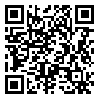September
Back to the articles list |
Back to browse issues page
1- Ph.D. in Reproductive Health, Assistant Professor of Midwifery, Department of Nursing and Midwifery, Ra.C., Islamic Azad University, Rasht
2- MSc. Scientific Member of Midwifery, Department of Nursing and Midwifery, Ra.C., Islamic Azad University, Rasht, Iran ,mossayebnezhad@iau.ac.ir
3- MSc Student in Midwifery, Department of Nursing and Midwifery, Ra.C., Islamic Azad University, Rasht, Iran
2- MSc. Scientific Member of Midwifery, Department of Nursing and Midwifery, Ra.C., Islamic Azad University, Rasht, Iran ,
3- MSc Student in Midwifery, Department of Nursing and Midwifery, Ra.C., Islamic Azad University, Rasht, Iran
Abstract: (21 Views)
Background and Objective: Eating disorders can significantly affect young people's health and quality of life (QOL). The present study examined the relationship between social anxiety, body image, depressive symptoms, and eating disorders among female students at Rasht Azad University.
Material and Methods: A correlational study was conducted using Structural Equation Modeling (SEM). A sample of 200 female students from Rasht Azad University was selected using convenience sampling. The participants completed the Eating Disorder Diagnostic Scale (EDDS), the Body Image Questionnaire (BIQ), the Beck Depression Inventory-II (BDI-II), and the Social Anxiety Questionnaire (SAQ) online. The SPSS (version 23) and AMOS 23 software were used to create correlation matrices and for SEM analysis.
Results: The SEM demonstrated significant associations between the variables examined. Notably, significant direct effects were identified between social anxiety and eating disorders (p<0.001), body image and eating disorders (p=0.006), the effect of depression on social anxiety (p<0.001), as well as body image and social anxiety (p<0.001). However, depression and eating disorders did not exhibit a significant association within the structural model (p=0.170).
Conclusion: Based on the current findings, social anxiety, poor body image, and depression are significant factors leading to eating disorders. Moreover, social anxiety appears to mediate between poor body image and depression with eating disorder symptoms. Therefore, universities are advised to offer training courses focusing on enhancing students perceived body image and communication skills and provide them with strategies for self-care and anxiety management.
Material and Methods: A correlational study was conducted using Structural Equation Modeling (SEM). A sample of 200 female students from Rasht Azad University was selected using convenience sampling. The participants completed the Eating Disorder Diagnostic Scale (EDDS), the Body Image Questionnaire (BIQ), the Beck Depression Inventory-II (BDI-II), and the Social Anxiety Questionnaire (SAQ) online. The SPSS (version 23) and AMOS 23 software were used to create correlation matrices and for SEM analysis.
Results: The SEM demonstrated significant associations between the variables examined. Notably, significant direct effects were identified between social anxiety and eating disorders (p<0.001), body image and eating disorders (p=0.006), the effect of depression on social anxiety (p<0.001), as well as body image and social anxiety (p<0.001). However, depression and eating disorders did not exhibit a significant association within the structural model (p=0.170).
Conclusion: Based on the current findings, social anxiety, poor body image, and depression are significant factors leading to eating disorders. Moreover, social anxiety appears to mediate between poor body image and depression with eating disorder symptoms. Therefore, universities are advised to offer training courses focusing on enhancing students perceived body image and communication skills and provide them with strategies for self-care and anxiety management.
Send email to the article author
| Rights and permissions | |
 |
This work is licensed under a Creative Commons Attribution-NonCommercial 4.0 International License. |


